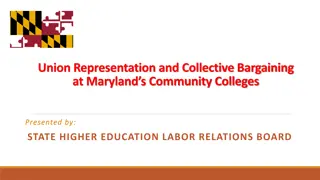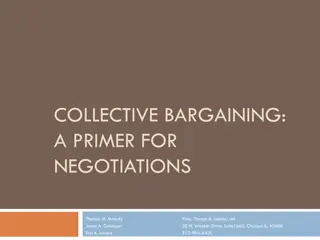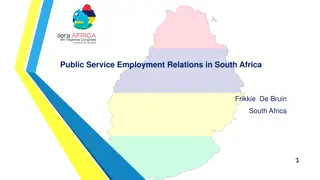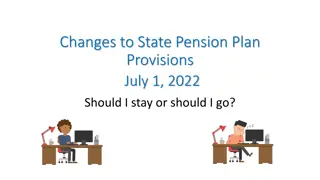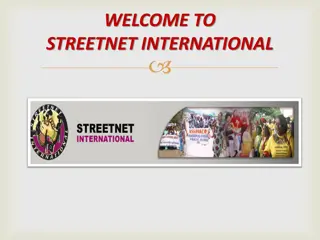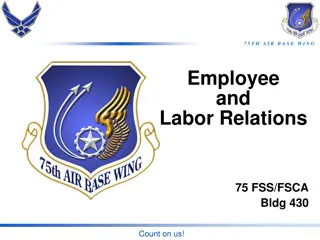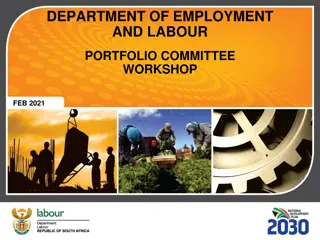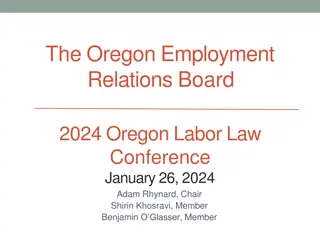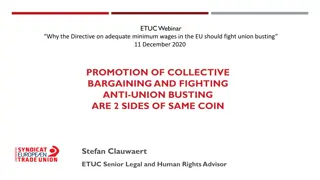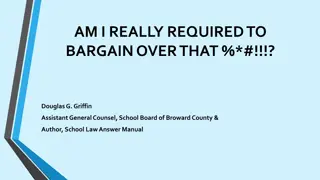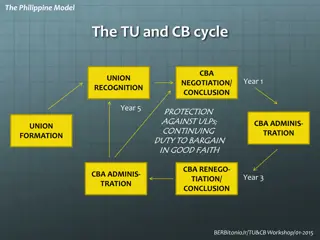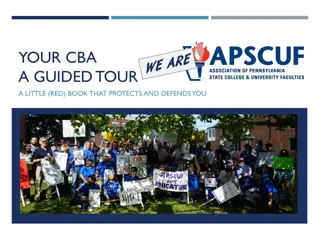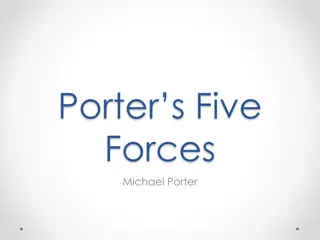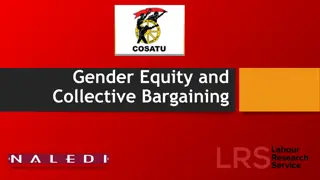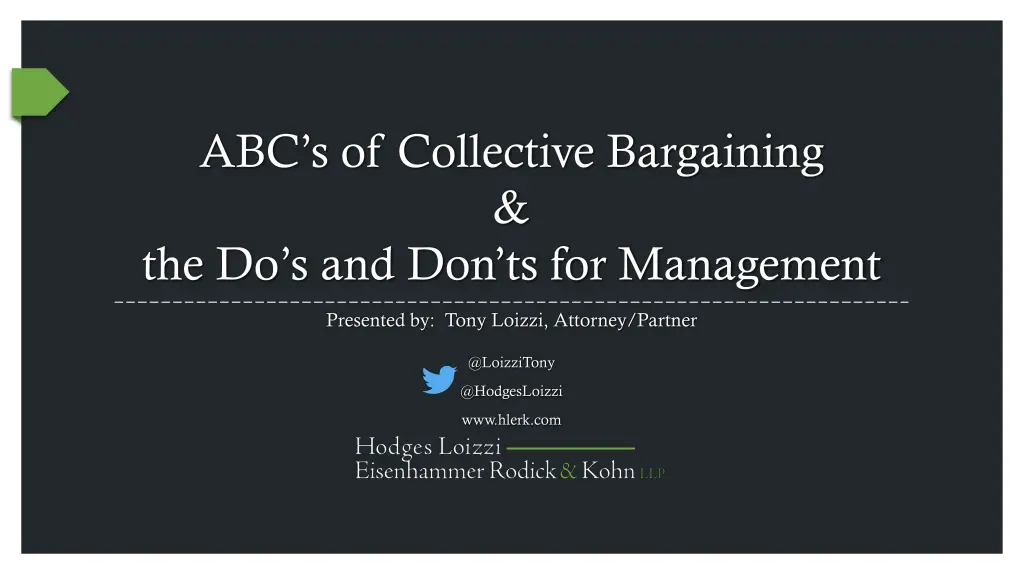
Understanding Collective Bargaining in Illinois Public School Districts
Gain insight into the collective bargaining process in Illinois public schools, explore key topics under discussion, and learn valuable do's and don'ts for management. Test your knowledge on negotiation scenarios and make informed decisions to effectively handle labor relations. Presented by Tony Loizzi, this session provides a comprehensive overview for school administration and board members.
Download Presentation

Please find below an Image/Link to download the presentation.
The content on the website is provided AS IS for your information and personal use only. It may not be sold, licensed, or shared on other websites without obtaining consent from the author. If you encounter any issues during the download, it is possible that the publisher has removed the file from their server.
You are allowed to download the files provided on this website for personal or commercial use, subject to the condition that they are used lawfully. All files are the property of their respective owners.
The content on the website is provided AS IS for your information and personal use only. It may not be sold, licensed, or shared on other websites without obtaining consent from the author.
E N D
Presentation Transcript
ABCs of Collective Bargaining & the Do s and Don ts for Management Presented by: Tony Loizzi, Attorney/Partner @LoizziTony @HodgesLoizzi www.hlerk.com
Todays Goals Gain a basic familiarity with the collective bargaining process in Illinois public school districts. Review current hot topics at the bargaining table. Review Do s and Don ts for the Administration/Board team. Questions.
Test Your Knowledge Your Board is fairly flexible about upcoming negotiations with the teachers, but would like the process to be handled quickly. Can you survey the teachers, find out what they want and just present their requested changes to the Union in a package at the first meeting?
Test Your Knowledge One of your insurance agents is offering a fantastic deal on a new benefit for mail order contact lenses. contact lenses at no additional charge to your employees. As a result, you can offer Should you accept the offer and inform employees of the new benefit?
Test Your Knowledge The current CBA contains no language about class size or the length of the teacher workday. The Union makes what it claims is a clean- up proposal to include language that sets forth the current practice with respect to class size and the length of the workday. Should you accept the proposal and move on?
Test Your Knowledge During contract negotiations, the Board s team tenders a proposal to maintain the same premium contribution formula for health insurance. One month later, while negotiations are still underway, two of the Board members spouses are laid off from their jobs. These two Board members have a renewed sense of how good the employees in the District really have it and convince the others to instead seek concessions on health insurance. What should you do?
Test Your Knowledge Your maintenance director comes to you as a bargaining team member because he is frustrated with the attendance of the District custodians. He requests that the team attempt to bargain language in the CBA that states he can impose discipline for abuse of sick leave if a custodian misses 10 or more work days in a year. Is this a good idea?
IELRA Basics Bargaining Duty to Bargain IELRA requires the employer to bargain collectively with representatives of duly recognized employee bargaining units. The duty to bargain does not require either party to agree to a proposal or require the making of a concession, but it does require the parties to meet at reasonable times and confer in good faith with respect to mandatory subjects of bargaining. Scope of Bargaining IELRA requires the employer to bargain over wages, hours, and terms and conditions of employment (i.e., the mandatory subjects of bargaining). IELRA does not require the employer to bargain over matters of inherent managerial policy, such as the employer's functions, standards of service, overall budget, organizational structure, selection of new employees and direction of employees. However, upon request, employers are required to bargain collectively regarding policy matters directly affecting wages, hours, and terms and conditions of employment and the impact of those matters on employees.
IELRA Basics Bargaining Grievance Procedure No-Strike Clause The Written Agreement
Core Components of Bargaining Process Collective Bargaining Mediation Impasse Strike Agreement (Ratification and Approval)
Strike Pre-Requisites Represented by union Tried mediation unsuccessfully (impasse reached) 14 days have passed after final offers made public 10 days after notice of intent to strike CBA has expired
Forms of Collective Bargaining Positional Bargaining Interest-Based Bargaining Hybrid Expedited Bargaining Affinity Process for $ Items
Preparing to Bargain Problems with status quo (e.g., ambiguous language, past grievances, language that impacts future initiatives) New legal issues Financial/costing information (e.g., scatter-gram, extra-curricular costs, health insurance, comparables, costing method) Anticipating concerns from other party Understanding parameters Prioritize issues
Selecting the Bargaining Team Who Should Serve on the Bargaining Team? Negotiations are all about problem-solving. Quite simply, the ideal bargaining team is composed of people who have good problem- solving skills and can bring a variety of needed perspectives to the team: listening ability, credibility, respect, competence, knowledge, communication skills, and authority.
Selecting the Bargaining Team Differing Perspectives Do we have people who bring the following: District-wide/Central office information Building-Level Information Financial Data Specialty Areas Constituency Relations
Selecting the Bargaining Team Professional Negotiators The law is complicated, the stakes are high and the resources are scarce. All of the attributes we look for in our lay-team members also apply to the professional negotiator. If your negotiator is part of the problem and not part of the solution, then make a change.
Unfair Labor Practices Bargaining Certain Prohibited Acts That Arise During Bargaining Refusing to bargain in good faith with the authorized representative (e.g., direct dealing, regressive bargaining, early take it or leave it offers) Refusing to reduce agreement to writing Discriminating Interfering, restraining or coercing employees in the exercise of their rights (e.g., threating, interrogating, spying, influencing selection of team members )
Potpourri of Big Issues at the Table Fair Share (Janus v. AFSCME) Wages (steps, lanes, schedules, minimum wage) Discipline Health Insurance Workday/Work Year Retirement Incentives Staff Shortage Issues TRS Contributions and potential Pension Cost Shift Evaluations (appeals process)
General Dos and Donts Do listen Don't circumvent the process Do be professional at all times Don't pontificate Do be supportive Don't negotiate in the press or public Do be fair, reasonable, open minded and flexible Don't be a hero Do be patient Don't get personal Do be firm, when necessary Don't get hung up on public versus private sector Do compile necessary data and know your comps Don t commit ULP
Impact of Being Included in CBA When a matter is addressed in the CBA, that typically means one of two things for the Board and the Administration: 1. We gave up the right to do or change something. (e.g., class size limit, defined workday/work year, plan time allotment, sick/personal days, health insurance premiums) 2. We agreed to use a process to do or change something. (e.g., progressive discipline, transfer procedure, assignment procedure, seniority)
CBA Provisions Recommended Management Rights Labor/Management Meetings Waiver of Additional Bargaining Hold Harmless Provisions Definitions (e.g., full-time, part- time, day, seniority) Non-Grievable Provisions Limit on Board Paid Benefits Severance Clause Right to Subcontract
CBA Provisions to Avoid Preamble/Principles FTE Guarantees Academic Freedom/Curriculum Issues Extended Leave Guarantees Parental/Other Complaints Release Time Work Environment Student Discipline Vacancies, Promotions, Transfers Student Grading Substitute Guarantees Special Education Issues Work Day Issues Job Descriptions/Duty Limitations Class Size Limits Response Time Guarantees Just Cause Discipline
Tony Loizzi aloizzi@hlerk.com @LoizziTony This is intended solely to provide information to the school community. It is not legal advice or a substitute for legal counsel. It is intended as advertising but not as a solicitation of an attorney/client relationship.


